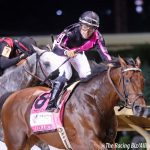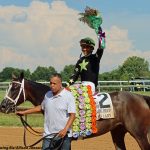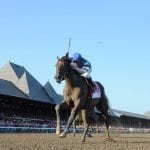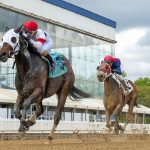Study: Virginia certified program has major impact
Virginia’s Certified Residency Program has generated nearly six dollars of economic impact for every dollar invested, according to a new study. The program, which provides incentives for horse owners to stable their young horses in Virginia, has paid out $14.6 million in bonuses over six years, returning $86.2 million in value.
That number includes over $54 million in direct economic impact and supports 825 jobs, the study says.
The study, blandly entitled “Economic Impact: Virginia-Certified Residency Program for Thoroughbred Horses,” was prepared by Chmura Economics & Analytics and reviewed the impacts of the program created after Colonial Downs became dormant a decade ago. Racing returned to Colonial Downs in 2019 after the track was sold.
“What the study does is verify what our members have been telling us about the program,” said Debbie Easter, Executive Director of Virginia Thoroughbred Association, which is part of the Virginia Equine Alliance, which initialized the review. “It has allowed them to grow their business, hire employees and make improvements to the farms.”
The incentive program benefits hundreds of Virginia horse farms that receive income from horse owners outside Virginia. It requires a horse to maintain a minimum six-month continuous residency in Virginia prior to the beginning of its three-year-old year. Many participants in the program stay longer.
“I think I would have been bankrupt or out of business if the program hadn’t been developed. I have never struggled like that before,” said Diana McClure, who credits the program for more than doubling her horse population from 20 to 50 horses at her DMC Stable in Berryville, Virginia. “I didn’t realize how big an effect the closing of Colonial Downs was. Nobody had any reason to send us any horses. I’m not exaggerating.”
McClure recalls a large meeting in Middleburg among the leaders of horsemen’s groups and farm owners to discuss what to do when the concept came up. Delaware had already developed a similar program Maryland and West Virginia, neighboring states to Virginia with year-round racing, had incentivized state-programs. When the idea surfaced, it quickly gained momentum.
“It has saved the infrastructure that we’ve also been hearing from [such as] blacksmiths, veterinarians, feed suppliers, that serves our members,” added Easter. “You can’t grow business without that infrastructure.”
Through 2023 over 5,000 horses had participated in the program since its launch in 2017. That alone supports 825 jobs in Virginia, part of the over 5,000 jobs that Virginia horse racing employs.
CHECK OUT THE LATEST OFF TO THE RACES RADIO!
Average daily spending per horse rose from an average $35 a day in 2017 to $52.50 a day in 2023. The program hasn’t just preserved Virginia’s thoroughbred industry, it has made it stronger and more resilient.
“We had a cycle during the year that had a gap between breaking horses and the meet at Colonial Downs where we were like squirrels gathering nuts,” explained McClure about earlier years. “The certified program filled that gap. We never kept such a consistent program until the certified program was developed.”
The bonus program allows horse “developers” – the owner at the time of the horse’s first race — to receive a 25% bonus which the horse wins open races throughout the Mid-Atlantic and a 10% bonus on wins in state-restricted races. Though the program has been fine-tuned over the years, it has, pardon the pun, stabilized hundreds of thoroughbred farms in Virginia both large and small.
Madison Meyers and her husband Kieran Norris started breaking and training thoroughbreds at the Middleburg training center when the program was started. Grateful Bred was a horse that was sent to their stable, Ballyerin Racing, LLC, in the first year of the program by then-owner Gordon “Gordie” Keys. Grateful Bred lists the 2021 Meadow Stable Stakes at Colonial Downs and Marland Million Turf Sprint among his wins and is now owned by Ballyerin Racing after Keys passed away in 2023.
“It’s been huge for us,” said Madison Meyers of the program. “My phone started ringing off the hook.”
She added, “It’s a great add-on for any horse from any state to race in the Mid-Atlantic. There are different ways to get certified, from weaning to yearling from breaking to training. It’s a big add-on for horses going to sale.”
When the couple kicked off their business in 2017 in Middleburg, they had 20 horses under their stable roof. Now they have 60 and could get more.
Rules of the Virginia-Certified Residency Program
The total economic impact includes both the $54 million in direct impact and indirect impacts — money used for such things as maintaining fences or purchasing office supplies – of $19.2 million. Induced impacts – economic activity generated when workers spend their money at retail stores, restaurants, etc. – was $12.5 million.
All of that supports rural economies and allows horse farms to thrive all year.
“For a state that doesn’t have year-round racing, we have businesses that have year-round programs,” added Easter.
LATEST NEWS














